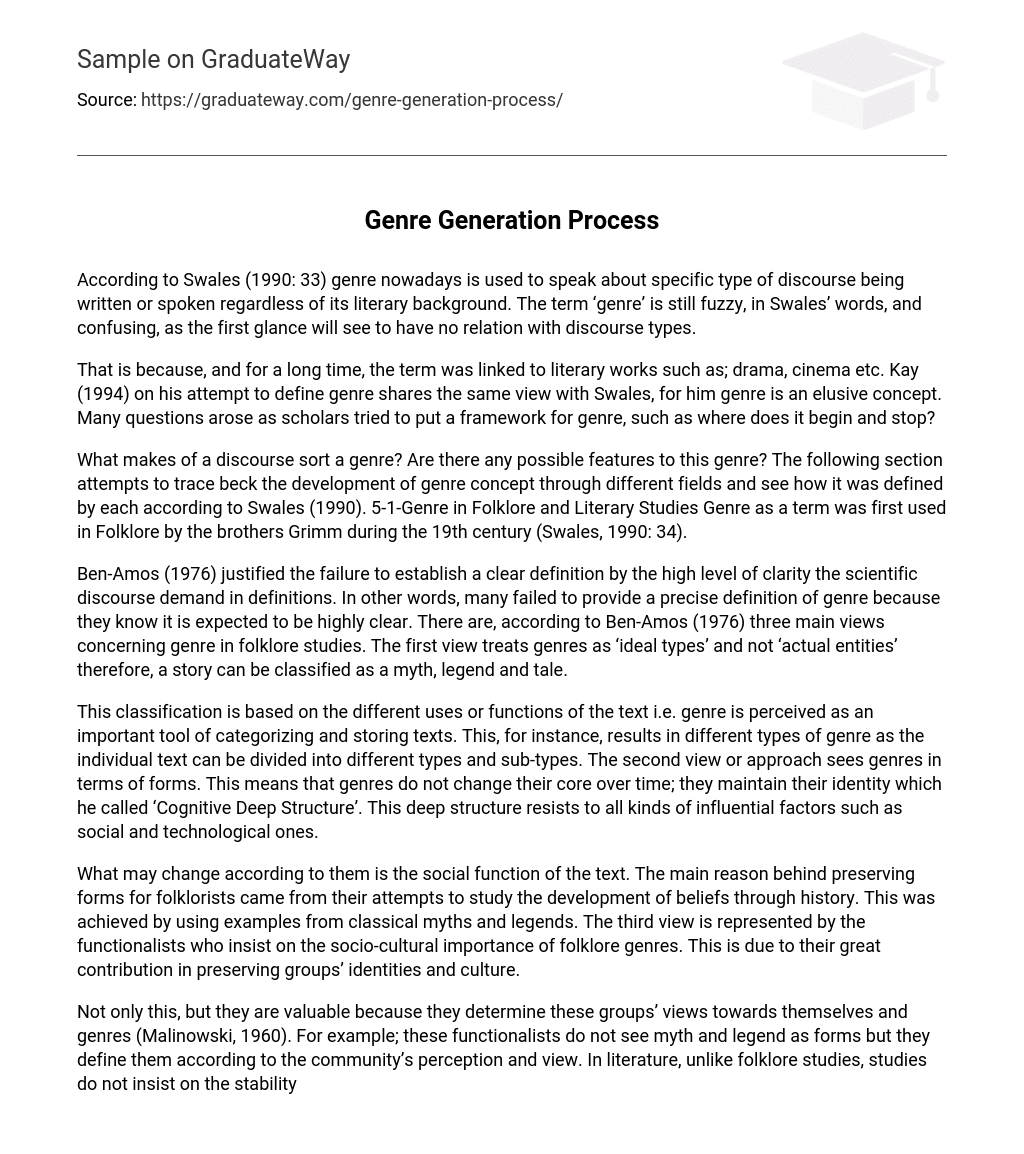According to Swales (1990: 33) genre nowadays is used to speak about specific type of discourse being written or spoken regardless of its literary background. The term ‘genre’ is still fuzzy, in Swales’ words, and confusing, as the first glance will see to have no relation with discourse types.
That is because, and for a long time, the term was linked to literary works such as; drama, cinema etc. Kay (1994) on his attempt to define genre shares the same view with Swales, for him genre is an elusive concept. Many questions arose as scholars tried to put a framework for genre, such as where does it begin and stop?
What makes of a discourse sort a genre? Are there any possible features to this genre? The following section attempts to trace beck the development of genre concept through different fields and see how it was defined by each according to Swales (1990). 5-1-Genre in Folklore and Literary Studies Genre as a term was first used in Folklore by the brothers Grimm during the 19th century (Swales, 1990: 34).
Ben-Amos (1976) justified the failure to establish a clear definition by the high level of clarity the scientific discourse demand in definitions. In other words, many failed to provide a precise definition of genre because they know it is expected to be highly clear. There are, according to Ben-Amos (1976) three main views concerning genre in folklore studies. The first view treats genres as ‘ideal types’ and not ‘actual entities’ therefore, a story can be classified as a myth, legend and tale.
This classification is based on the different uses or functions of the text i.e. genre is perceived as an important tool of categorizing and storing texts. This, for instance, results in different types of genre as the individual text can be divided into different types and sub-types. The second view or approach sees genres in terms of forms. This means that genres do not change their core over time; they maintain their identity which he called ‘Cognitive Deep Structure’. This deep structure resists to all kinds of influential factors such as social and technological ones.
What may change according to them is the social function of the text. The main reason behind preserving forms for folklorists came from their attempts to study the development of beliefs through history. This was achieved by using examples from classical myths and legends. The third view is represented by the functionalists who insist on the socio-cultural importance of folklore genres. This is due to their great contribution in preserving groups’ identities and culture.
Not only this, but they are valuable because they determine these groups’ views towards themselves and genres (Malinowski, 1960). For example; these functionalists do not see myth and legend as forms but they define them according to the community’s perception and view. In literature, unlike folklore studies, studies do not insist on the stability of genre texts. Because one of the main tasks of literary man or author is to bring newness or what already exists and break it. Todorov (1976: 159) shed the light on the changes genre went through during 19th century.
He spoke about ‘genre generation process’ which means that new genres emerge out of other genres which undergo certain changes. He further puts it that he is against defining genres as classes or types of texts. But he prefers to define them as ‘a codification of discursive properties’ (p.162). Hepburn (1983; 496) stressed the importance of genre in literature, he further claimed that any development and progress in creative arts, mainly literature, is due to genre. Fowler (1982, 31) specified more the role of genre in literature by stating that this value is noticeable for writers mainly, he described genre as a ‘positive support to authors’.





